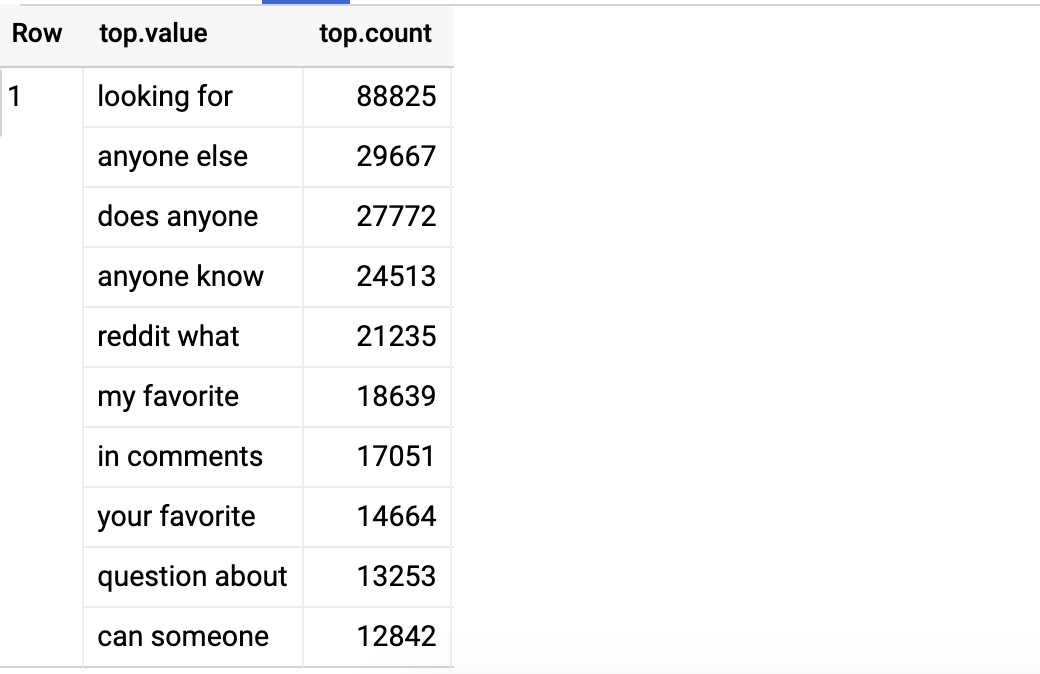I want to find the most common bi-grams (pair of words) in my table. How can I do this with BigQuery?
How to find the most common bi-grams with BigQuery?
Asked Answered
Now with a new function: ML.NGRAMS():
WITH data AS (
SELECT REGEXP_EXTRACT_ALL(LOWER(title), '[a-z]+') title_arr
FROM `fh-bigquery.reddit_posts.2019_08`
WHERE title LIKE '% %'
AND score>1
)
SELECT APPROX_TOP_COUNT(bigram, 10) top
FROM (
SELECT ML.NGRAMS(title_arr, [2,2]) x
FROM data
), UNNEST(x) bigram
WHERE LENGTH(bigram) > 10
Docs:
Thanks for sharing, @Felipe The statement that you provide is nested within a row. How would you "unnest" it further so that the only output columns are top.value and top.count and not the Row column? –
Indiscipline
BigQuery now supports SPLIT():
SELECT word, nextword, COUNT(*) c
FROM (
SELECT pos, title, word, LEAD(word) OVER(PARTITION BY created_utc,title ORDER BY pos) nextword FROM (
SELECT created_utc, title, word, pos FROM FLATTEN(
(SELECT created_utc, title, word, POSITION(word) pos FROM
(SELECT created_utc, title, SPLIT(title, ' ') word FROM [bigquery-samples:reddit.full])
), word)
))
WHERE nextword IS NOT null
GROUP EACH BY 1, 2
ORDER BY c DESC
LIMIT 100
Lovely!! where can some documentation can be found? –
Appenzell
Soon in developers.google.com/bigquery/docs/query-reference. I couldn't wait to share the news :) –
Bulger
@FelipeHoffa This is using LegacySQL, any chance you'd be up for updating this using StandardSQL? –
Comminute
check out the new
ML.NGRAMS() function in my new answer below –
Bulger Now with a new function: ML.NGRAMS():
WITH data AS (
SELECT REGEXP_EXTRACT_ALL(LOWER(title), '[a-z]+') title_arr
FROM `fh-bigquery.reddit_posts.2019_08`
WHERE title LIKE '% %'
AND score>1
)
SELECT APPROX_TOP_COUNT(bigram, 10) top
FROM (
SELECT ML.NGRAMS(title_arr, [2,2]) x
FROM data
), UNNEST(x) bigram
WHERE LENGTH(bigram) > 10
Docs:
Thanks for sharing, @Felipe The statement that you provide is nested within a row. How would you "unnest" it further so that the only output columns are top.value and top.count and not the Row column? –
Indiscipline
The standard SQL version:
SELECT word, nextword, COUNT(*) c FROM (
SELECT pos, title, word, LEAD(word) OVER(PARTITION BY created_utc,title ORDER BY pos) nextword FROM (
SELECT created_utc, title, word, pos FROM (
SELECT created_utc, title, SPLIT(title, ' ') word FROM `bigquery-samples.reddit.full`), UNNEST(word) as word WITH OFFSET pos))
WHERE nextword IS NOT null
GROUP BY 1, 2
ORDER BY c DESC
LIMIT 100
When unnesting an ARRAY you can retrieve the position of that element using the following syntax:
UNNEST(word) as word WITH OFFSET pos
check out the new
ML.NGRAMS() function in my new answer below –
Bulger © 2022 - 2024 — McMap. All rights reserved.

